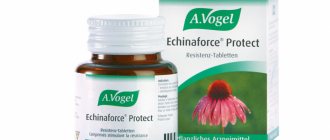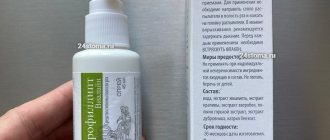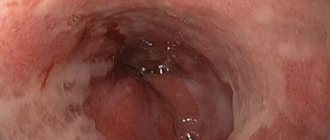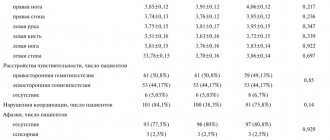A severe dry cough with poorly separated sputum requires the use of medications to change the properties of the secretion produced by the bronchi. Treatment leads to a decrease in the viscosity of mucus, its accelerated evacuation from the respiratory tract, the free passage of air into the lungs and the regeneration of damaged mucous membranes. One of the representatives of such drugs is powdered “ACC”.
What is ACC
The active component of the drug is acetylcysteine. This substance helps to liquefy the mucous secretion, increase its volume and improve its discharge to the outside. ACC is intended for oral use. For this purpose, several pharmaceutical forms are produced:
- soluble effervescent tablets: white, with berry flavor, active substance dosage - 100–600 mg each;
- granulated mixture for hot drinks;
- flavored baby powders with vitamin C: in dark bottles of 30–60 g.
Among the formative additives and drug stabilizers: soda, sugar, lactose.
Drug interactions ACC
Tetracycline antibiotics (with the exception of doxycycline) are not recommended for use simultaneously with ACC Children. Cases of inactivation of antibiotics of other groups by acetylcysteine were noted exclusively during in vitro , with direct mixing of the latter. But for the safety of the patient, the interval between taking antibiotics and acetylcysteine should be at least 2 hours. When using the drug simultaneously with antitussives, due to a decrease in the cough reflex, dangerous stagnation of mucus is possible. Acetylcysteine may potentiate the vasodilating effect of nitroglycerin. In vitro, acetylcysteine is incompatible with semisynthetic penicillins, cephalosporins, and aminoglycosides. There is no data on the incompatibility of the drug with antibiotics such as amoxicillin, erythromycin and cefuroxime.
What kind of cough does ACC help with?
Penetrating inside, acetylcysteine reduces the viscosity of the mucous secretion, promotes the influx of moisture into it, and dilutes the resulting clots. As a result of using the medicine:
- sputum increases in volume and is easier to cough up;
- swelling and inflammation in the respiratory tract decreases;
- thanks to the expectorant action, non-productive cough is relieved;
- the accumulation of exudate in inflamed areas is prevented.
For so-called dry cough caused by irritation of the functional epithelium without sputum production, ACC is not used. A mucolytic drug is intended for wet coughs in order to help the body cleanse itself of accumulated secretions.
After oral administration, the medicine is concentrated in the blood and tissues, starting to work within 1–1.5 s. In the body, the components of ACC are transformed by the liver, and the metabolites are completely eliminated 6–8 hours after administration, not accumulating inside.
General information
The medicine is an expectorant-type mucolytic, which allows you to accelerate the accumulation of sputum in the respiratory section. The product consists of small granular particles, each sachet contains 200 mg of active ingredients. The composition of the medication is represented by the following components:
- acetylcysteine;
- ascorbic acid;
- sucrose, saccharin;
- honey and citrus flavoring.
Granules are white, less often yellowish, with a pronounced aroma of honey and citrus.
An increase in the fluidity of thick mucous secretion, which arises under the influence of pathogenic microflora, occurs due to the active component acetylcysteine. Its effectiveness has been proven in clinical studies; good results are obtained even in the presence of purulent clots in the sputum.
For what diseases is ACC necessary?
The drug helps in the treatment of several types of pathologies in which an excessive amount of mucous secretion is formed:
- tracheitis, laryngitis;
- acute and chronic inflammation of the bronchi;
- pneumonia;
- COPD;
- complicated course of ARVI with damage to the lower respiratory tract;
- pulmonary abscesses;
- cystic fibrosis;
- sinusitis;
- inflammation of the ear with the formation of accumulations of exudate.
ACC has no effect on the intensity of the disease and does not have an antimicrobial, anti-inflammatory or prophylactic effect. This is a symptomatic drug that reduces the most painful manifestations of diseases.
Therapeutic effect
Acetylcysteine reduces the viscosity of sputum in a wide range of acute and chronic pathologies, and can be used for suppuration and complicated inflammation.
- Quickly facilitates breathing, prevents further irritation of the trachea and bronchi by mucus, helping to reduce inflammation and tissue regeneration.
- The medicine does not suppress the cough reflex, has an expectorant effect, helping the body to independently get rid of stagnant secretions.
- ACC also reduces painful dry cough caused by clots of viscous sputum that irritate the lungs.
- Helps relieve nasal congestion due to sinus inflammation.
- Prevents severe otitis media.
After consumption, the components of the drug are absorbed into the blood from the stomach cavity. They are concentrated as much as possible in the body and begin to act within 1 hour. About half of the ingested dose of ACC interacts with plasma proteins.
When the drug is transformed in the liver, low-active metabolites are released. They are excreted primarily in the urine, are not deposited in tissues, and do not cause toxic effects. The remaining medication completely leaves the body within 6–8 hours.
How to use ACC powder and granules
The medicinal substrate must first be diluted in 0.5 cups of liquid at a comfortable temperature: not scalding, but quite hot. You can use water, juices, fruit drinks or weak tea. Recommended doses of the drink:
- age 2–6 years: no more than 300 mg of the drug per day, divided into 2–3 servings;
- from 6 to 14 years: up to 400 mg of active ingredient per day;
- patients over 14 years of age and adults can take up to 600 mg of the drug per day in 2–3 doses;
- for cystic fibrosis, the dosage can be increased to 800 mg per day.
The medicine should be taken 1-2 hours after meals or on an empty stomach. Food reduces the absorption of ACC.
Pharmacological properties of the drug ACC
Acetylcysteine is a mucolytic, expectorant, derivative of the amino acid cysteine. Due to the presence of a free sulfhydryl group, acetylcysteine breaks the bisulfide bonds of acidic mucopolysaccharides of sputum, which leads to depolymerization of mucoproteins and increases the viscosity of bronchial secretions. The drug facilitates sputum discharge by increasing mucociliary clearance. Acetylcysteine also has antioxidant and pneumoprotective properties, which is due to the ability of sulfhydryl groups to bind free radicals. In addition, acetylcysteine helps increase the synthesis of glutathione, which is an important detoxification factor. This feature of acetylcysteine makes it possible to use it as an antidote for acute poisoning with paracetamol and other substances (aldehydes, phenols, etc.). After oral administration, acetylcysteine is quickly and almost completely absorbed in the digestive tract. In the liver it is metabolized to cysteine (a pharmacologically active metabolite) and diacetylcystine, cystine and then to mixed disulfides. The bioavailability of acetylcysteine after oral administration is about 10%. The maximum concentration after oral administration is achieved after 1–3 hours. The main metabolite of the drug, cystine, is determined in the blood plasma at a maximum concentration of 2 µmol/l. About 50% of the drug binds to blood plasma proteins. In the body, acetylcysteine and its metabolites are determined in various forms: partly as a free substance, partly in connection with blood plasma proteins, partly as incorporated amino acids. It is excreted almost completely in the form of inactive metabolites (inorganic sulfates, diacetylcystine) in the urine. Only a small amount of acetylcysteine is excreted unchanged in the feces. The half-life from blood plasma is approximately 1 hour and depends on the rate of biotransformation in the liver. In case of liver failure, it can be extended up to 8 hours. Acetylcysteine can penetrate the placental barrier and accumulate in the amniotic fluid.
Who is ACC contraindicated for?
In addition to pregnant women and children under 2 years of age, the use of the medicine is prohibited for the following conditions:
- stomach ulcer in the acute stage;
- internal bleeding;
- hypersensitivity to drug substances;
- Effervescent tablets are prohibited for patients with diabetes and children under 6 years of age.
The medicine should be used with caution by patients with varicose veins, hypertension, renal failure, and people with disorders of the adrenal glands and liver. They need to discuss reduced dosage therapy with their doctor and monitor their well-being more closely.
Contraindications for ACC
ACC is contraindicated in the following cases:
- high sensitivity to the components included in the drug;
- exacerbation of peptic ulcers;
- pulmonary hemorrhage and hemoptysis;
- children under 2 years of age;
- pregnancy and lactation period.
Special Recommendations
For what type of cough should ACC be used?
Cough is one of the main symptoms accompanying infectious respiratory diseases. In the process of inflammation of the respiratory tract, changes occur that provoke the formation of viscous mucus - sputum.
The drug cannot be called a universal antitussive and is rarely prescribed for dry cough, as a first-line remedy. But nevertheless, ACC for dry cough is acceptable if the dry cough does not cause discomfort and does not impair the quality of life, does not disturb sleep and appetite, does not lead to vomiting, is not paroxysmal, that is, does not require the use of antitussive drugs.
ACC for dry cough can be used at the very beginning of the disease, to accelerate the transition of a cough from unproductive to productive, or with an unproductive cough to dilute viscous sputum and speed up its discharge.
During a productive cough, thanks to ACC, sputum discharge occurs faster and easier, due to which the bronchi and lungs are cleansed. At the same time, the sputum becomes more liquid.
ACC and kidney diseases
For kidney diseases at any stage, ACC is taken only after a doctor’s prescription and under his strict supervision. Components of the drug may conflict with other medications taken for renal failure and other kidney diseases.
ACC and alcohol
No interaction of the main active component of the mucolytic drug ACC with ethanol was detected. However, this does not mean that the drug can be used together with alcohol.
The main purpose of any drug is to eliminate the infection that has entered the body and alleviate the painful state of the body, promoting its further recovery. Alcohol, on the contrary, actively reduces the body’s protective and regenerative functions, exacerbating the body’s immunodeficiency. Accordingly, the effectiveness of the drug will also be reduced by alcohol. In addition, drinking alcohol can cause side effects of acetylcysteine.
ACC for pregnant and lactating
At the research stage, no direct or indirect harm to the mother and fetus was identified.
At the same time, there is a possibility of negative effects of acetylcysteine on the mother’s body and the development of the fetus remains. Therefore, taking the drug during pregnancy is contraindicated. If during the period of breastfeeding a child there is an urgent need to take ACC, stop feeding for the period of treatment.
ACC for children
In children with respiratory diseases as a result of viral or infectious diseases, sputum formation occurs differently than in adults. The secretion secreted by the bronchi has a more viscous structure. At the same time, the chest muscles of a child are much weaker than those of an adult. This is why coughing up sputum in children is much more difficult. In addition, sputum that stagnates in a child’s body can cause a faster spread of infection since it is a favorable environment for the proliferation of harmful bacteria and viruses.
Children's ACC is also prescribed only by a doctor based on preliminary research. You can take the drug at the first signs of cough. This allows you to avoid stagnation of sputum, since the drug provokes its liquefaction, thereby facilitating its coughing.
Indications
The drug is prescribed for the symptomatic treatment of respiratory and hearing diseases:
- pathological processes of the bronchi and lungs, leading to excessive production of mucous secretions;
- cough due to ARVI, tracheitis, laryngotracheitis;
- acute, chronic, obstructive bronchitis;
- cystic fibrosis;
- acute and chronic pneumonia;
- lung abscesses;
- otitis media of the middle ear with stagnation of exudate;
- sinusitis.
Drug interactions
ACC should not be combined with a course of therapy with cough suppressants. This combination is fraught with stagnation of sputum, respiratory depression and the development of subsequent complications.
The active substance of the drug prolongs and enhances the effect of vasodilators. It may be necessary to adjust the doses of the latter, or take medications on different days.
The simultaneous use of ACC and certain antibiotics is undesirable: from the groups of cephalosporins, tetracyclines, penicillins. The antimicrobial effect of treatment in such cases is significantly reduced. During therapy, it is necessary to maintain a time interval between medications of at least 3 hours.
How does ACC work?
According to the instructions, ACC is classified as a means of thinning mucus and facilitating its removal.
Acetylcysteine can make bronchial secretions less viscous. The mucolytic effect persists even if the sputum is mixed with pus.
This substance can also increase cell protection from the effects of severe inflammation and have a detoxic effect on the body.
In people diagnosed with cystic fibrosis or chronic bronchitis, preventive treatment helps reduce the number of exacerbations and make them easier to progress.
Description of the medicine
ACC is available in several dosage forms:
- effervescent tablets with a dosage of 100 and 200 mg;
- effervescent tablets with an increased dosage of 600 mg (ACC Long);
- syrup with a dosage of 20 mg in 1 ml;
- powder for preparing a solution with a dosage of 100, 200 and 600 mg.
All types of the drug contain acetylcysteine as the main active ingredient.
Effervescent tablets have the shape of a flat cylinder and a score, white color and blackberry aroma. The finished medicine is colorless, transparent with a light berry aroma. Sold in cylindrical tubes of 10 or 20 pieces, which are placed in a cardboard box along with instructions.
The powder is white granules without inclusions, with a characteristic orange aroma. Sachets with powder are placed in boxes of 6 or 20 pieces, depending on the dosage of the main substance.
ACC syrup is colorless, transparent, and has a cherry aroma. Sold in 100 ml darkened glass bottles, placed in boxes, with an additional syringe or measuring cup.
Side effects
Most patients, if they follow the instructions and instructions of the doctor, tolerate the effect of the drug well. Negative reactions to it are rare, usually when recommended dosages are exceeded or there are hidden contraindications. During treatment it is possible:
- digestive disorders: diarrhea, decreased appetite, heartburn, stomach pain;
- headache;
- attacks of hypertension, increased heart rate, shortness of breath;
- increased body temperature;
- bleeding gums.
If such signs appear during treatment, urgent medical consultation is required.




